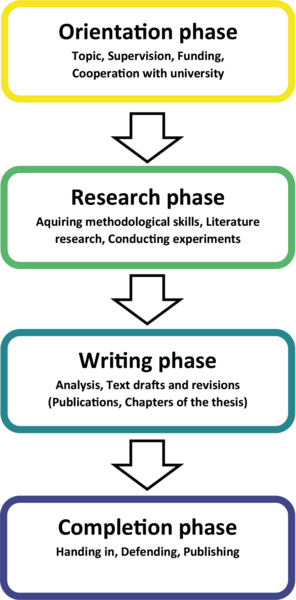Doctoral Research at Aalen University
Aalen University is one of the most research-intensive Universities of Applied Sciences (UAS) in Germany. All five faculties contribute to the research activity of the university.
Getting a doctoral degree with Aalen University is possible via two ways: with the "Promotionsverband der HAW Baden-Württemberg" or in a cooperative doctorate together with a university in Germany or abroad.
Doctorate in the Promotionsverband BW:
In autumn 2022, the independent right to award doctoral degrees for UAS in the state of Baden-Württemberg was bestowed on the newly founded "Promotionsverband der HAW Baden-Württemberg (Promotionsverband BW)", an association of all UAS in Baden-Württemberg. Part of the assocation is the doctoral center BW-CAR. Members of the center are research-active professors of the UAS in Baden-Württemberg, who have the right to award doctoral degrees through the "Promotionsverband". The center consists of five research units. 38 professors of Aalen University are a member in the doctoral center.
Cooperative Doctorate:
In a cooperative doctorate, the supervision is carried out by a professor from the UAS and a professor from a university. The doctoral degree is awarded by the cooperating university. Some of the professors of Aalen University are also co-opted or associated members at universities and can supervise doctoral researchers independently.
We support you with counseling on all matters around the topic of pursuing a PhD. Please do not hesitate to contact us: researchacademy@hs-aalen.de
Enrolment in a doctoral study program
Doctoral candidates who have been accepted for a doctorate by the Promotionsverband BW (Association for Doctoral Studies Baden-Württemberg) must, in accordance with Section 38 (5) sentence 1 of the Landeshochschulgesetz für Baden-Württemberg (LHG, State University Law for Baden-Württemberg), enroll at the UAS of their first supervisor, starting from the date of acceptance as a doctoral researcher and for the duration of their doctorate. Doctoral candidates who are employed at Aalen University on at least a 50% basis may request exemption from the enrolment requirement. In accordance with the enrolment regulations of Aalen University, the enrolment must take place no later than two months after acceptance as a doctoral researcher in the Promotionsverband BW.
To enroll in a doctoral study program or to request exemption from enrolment, please send an email to: researchacademy@hs-aalen.de. The Research Academy will provide you with the forms currently required. For enrolment, In addition to the forms, you will need the acceptance letter from the Promotionsverband BW and a current passport photo for your student identity card.
If you have any questions regarding the enrolment process, please contact us: researchacademy@hs-aalen.de
Members of Aalen University in the doctoral center BW-CAR
Prof. Dr. Anja Dieckmann (anja.dieckmann@hs-aalen.de)
Prof. Dr. Stefan Fetzer (stefan.fetzer@hs-aalen.de)
Prof. Dr. Ingmar Geiger (ingmar.geiger@hs-aalen.de)
Prof. Dr. Ralf-Christian Härting (ralf.haerting@hs-aalen.de)
Prof. Dr. Regina Kempen (regina.kempen@hs-aalen.de)
Prof. Dr. Anna Nagl (anna.nagl@hs-aalen.de)
Prof. Dr. Kerstin Rieder (kerstin.rieder@hs-aalen.de)
Prof. Dr. Robert Rieg (robert.rieg@hs-aalen.de)
Prof. Dr. Manfred Rössle (manfred.roessle@hs-aalen.de)
Prof. Dr. Patrick Ulrich (patrick.ulrich@hs-aalen.de)
Prof. Dr. Ralf von Baer (ralf.vonbaer@hs-aalen.de)
Prof. Dr. Christian Neusüß (christian.neusuess@hs-aalen.de)
Prof. Dr. Ulrich Schiefer (ulrich.schiefer@hs-aalen.de)
Prof. Dr. Herbert Schneckenburger (herbert.schneckenburger@hs-aalen.de)
Prof. Dr. Andreas Walter (andreas.walter@hs-aalen.de)
Prof. Dr. Doris Aschenbrenner (doris.aschenbrenner@hs-aalen.de)
Prof. Dr. Orsolya Csiszár (orsolya.csiszar@hs-aalen.de)
Prof. Dr. Markus Glaser (markus.glaser@hs-aalen.de)
Prof. Dr. Arif Kazi (arif.kazi@hs-aalen.de)
Prof. Dr. Markus Kley (markus.kley@hs-aalen.de)
Prof. Dr. Marcus Liebschner (marcus.liebschner@hs-aalen.de)
Prof. Dr. Stephan Ludwig (stephan.ludwig@hs-aalen.de)
Prof. Dr. Rainer Börret (rainer.boerret@hs-aalen.de)
Prof. Dr. Achim Frick (achim.frick@hs-aalen.de)
Prof. Dr. Dagmar Goll (dagmar.goll@hs-aalen.de)
Prof. Dr. Andreas Heinrich (andreas.heinrich@hs-aalen.de)
Prof. Dr. Martina Hofmann (martina.hofmann@hs-aalen.de)
Prof. Dr. Lothar Kallien (lothar.kallien@hs-aalen.de)
Prof. Dr. Volker Knoblauch (volker.knoblauch@hs-aalen.de)
Prof. Dr. Markus Merkel (markus.merkel@hs-aalen.de)
Prof. Dr. Harald Riegel (harald.riegel@hs-aalen.de)
Prof. Dr. Gerhard Schneider (gerhard.schneider@hs-aalen.de)
Prof. Dr. Steffen Schwarzer (steffen.schwarzer@hs-aalen.de)
Prof. Dr. Timo Sörgel (timo.soergel@hs-aalen.de)
Prof. Dr. Heinrich Steinhart (heinrich.steinhart@hs-aalen.de)
Prof. Dr. Iman Taha (iman.taha@hs-aalen.de)
FAQ - Doctorate
To be admitted as a doctoral researcher, you need a qualifying degree in a topic that is related to that of the PhD. Usually, this is a Master's degree or Diploma. If you have received your degree from a UAS, you might have to fulfill further requirements, such as a qualifying interview or additional courses. The respective university decides on the admission.
Apart from the formal requirements, you should bring the motivation to focus on a research topic over a long period of time.
A doctorate in Germany takes approximately three to five years. The duration depends also on the research area and on personal circumstances, for example if you are working part-time.

